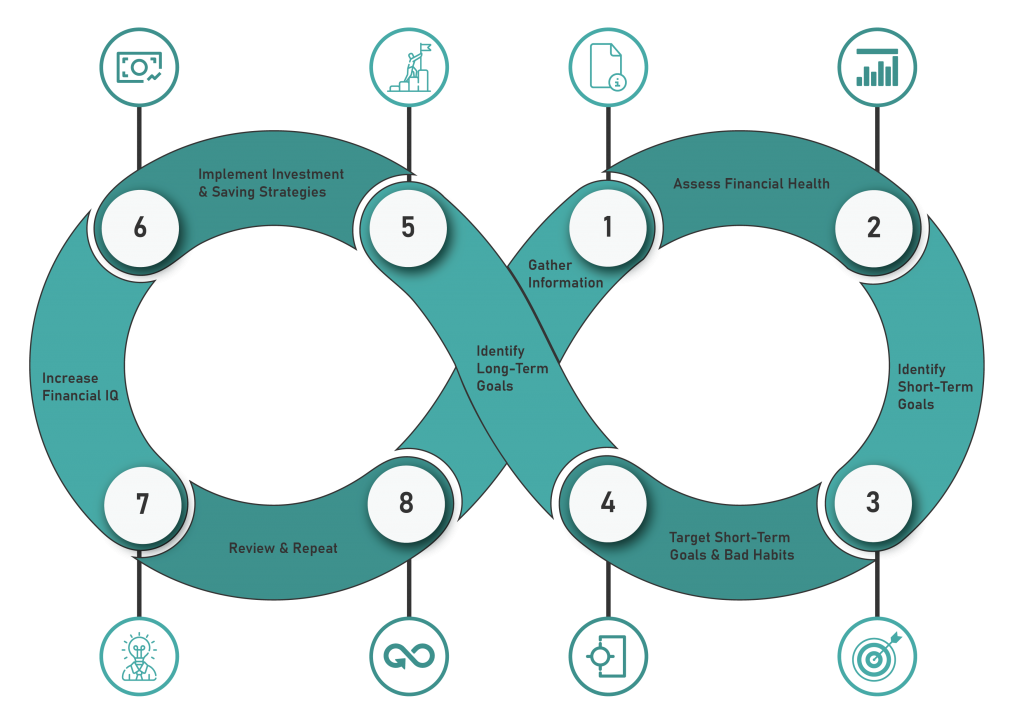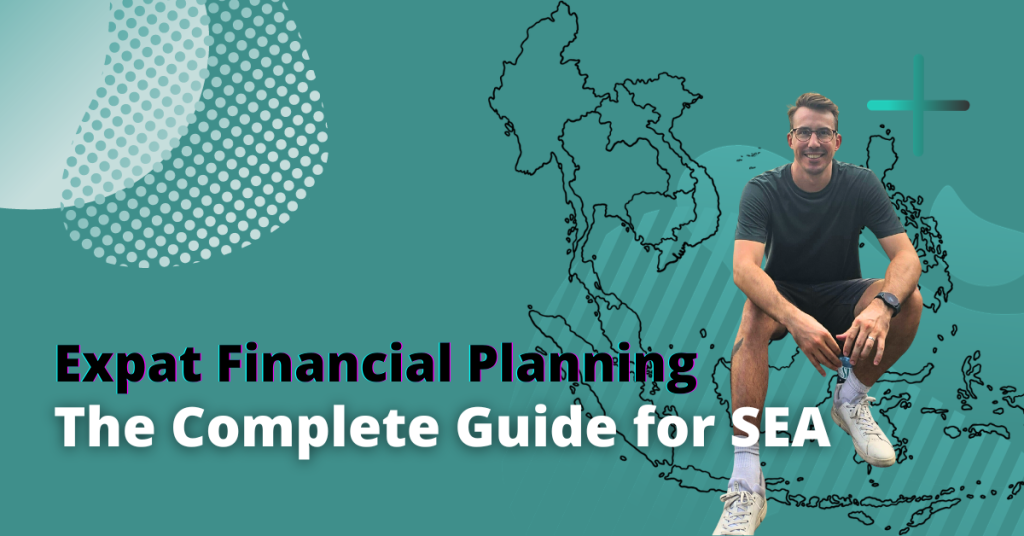How to Make a Financial Plan for Expats in Southeast Asia
Over half of all expats move home within five years of venturing abroad, with financial problems being the main reason. At 31%, financial problems came out as the leading cause followed closely by family reasons and job dissatisfaction at 29% and 25%, respectively.
The survey, conducted by HSBC in 2018, went on to find that financial problems were more common in younger expats, whereas expats who are financially literate are less likely to return home.
These are some crazy statistics that really hammer home the importance of expat financial planning and making a financial plan in Southeast Asia. Especially for all the expats who intend to move home with a sizeable nest egg at the end of their overseas experience.
So, if you’re living abroad, it is crucial that you understand the importance of how to make a financial plan as an expat and then take the necessary steps to master your financial future.
In this guide, we’ll walk you through the steps you need to take to create a solid expat financial plan that caters to your needs as an expat.
Challenges in Financial Planning for Expats
Financial planning for expats in Southeast Asia, as well as other emerging countries, comes with its own unique set of challenges. One of the biggest is dealing with fluctuating exchange rates!
This is because a sudden change in exchange rates can drastically affect the value of your income, as well as your spending power and long-term financial plan.
For example, if you earn your salary in Vietnamese Dong (VND) but you plan and save for your long-term financial future in EUR, your salary would effectively decrease if the VND drops in value against the EUR.
Expats will also have to learn to understand and navigate the regulatory landscape between their home and host countries. For example, are there any tax treaties in place between the two countries and how would you go about declaring your taxes if you had to?
Ultimately though, the biggest hurdle faced by most when it comes to expat financial planning is not knowing who to trust and subsequently trying to understand the plethora of financial products and investment plans on offer. Even those offered by your bank will likely not be in your best interest!
In order to avoid these challenges you need a good financial plan, and here’s why.
Understanding the Need for an Expat Financial Plan in Southeast Asia
Having a financial plan as an expat is the best way to get you from where you are to where you need to be. Not only does it function as your road map to financial freedom, but it also removes all the guesswork from what you should be doing with your finances. Considering the challenges mentioned earlier, the financial plan can help you account for things like currency fluctuation, give you an abundance of financial stability by having adequate savings and remove the need to get help from Southeast Asia’s so-called “independent” financial advisors.
Good financial plans also safeguard you from unexpected financial difficulties by taking into consideration any and all expected and unexpected costs you may face. It tells you what to plan for, what to consider, and it acts as a barrier protecting your net worth.
Think of a financial plan like planning a big holiday. In order to have a full itinerary you need to know when you’re travelling and how long you’re travelling for; where your flights are going to take you and any transiting stops on the way; and, the cost of the flights, accommodation and transport. You can’t just plan a holiday with the end goal in mind, you have to know how to get there and what it will cost you!
This is what a great financial plan will do. It will help you visualise and plan for every eventuality that will help you get towards your goals and ensure your financial stability.
Initial Steps of Making a Financial Plan as an Expat in SEA
Determine financial health
The initial steps of making a financial plan as an expat is to gather as much information as you possibly can about your current financial situation in order to assess your financial health. This includes getting intimate with your current cash flow and knowing exactly how much you earn and spend every month, as well as determining your current net worth (total assets – total liabilities).
Develop financial goals as an expat
From there, you make a list of all your short and medium-term financial goals. These should include any known upcoming expenses over the next 5 years, and an emergency fund for any unexpected costs that may arise.
By knowing your current financial situation and goals, you can develop a plan to pick them off either one at a time or all at once. On the other hand, your financial situation might even require you to revisit and readjust your goals if they aren’t achievable.
For example, if you want to save up $2,000.00 for a holiday that is 10 months away, your expat financial plan will tell you that you have to put $200.00 aside every month in order to afford it. However, if your budget and current cash flow reveal that you only have $100.00 spare every month, you should probably consider a cheaper destination for your holiday.

Once you’ve done this, you can look into long-term saving strategies and retirement planning as shown in the financial journey loop above.
Completing Your Expat Financial Plan
Making an expat financial plan in Southeast Asia is difficult. Not only because managing your money can be difficult in the region, but also because normal long-term planning isn’t as easy for expats.
In your home country, a percentage of your salary would go towards taxes and other social contributions which would allow you to draw a pension in retirement. Additionally, most developed countries will also have various laws requiring employers to set up some form of private corporate pension plan for employees that help facilitate long-term financial planning.
Unfortunately, most expats don’t contribute towards social insurance in their home countries nor do they get corporate-sponsored pension plans with a matching contribution benefit, to boot.
And so, the final things we need to consider with our financial plan are our long-term goals and retirement needs.
Saving Strategies for Expats
As a general rule of thumb, you do not want to save cash for retirement. This is because your money will be worth less over time due to inflation.
However, there are several reasons why you might need to have cash savings for longer than 5 years and this is usually when you are saving for larger purchases but might still need quick access to your money.
Such cases may include saving for a house/apartment deposit or a cash vehicle purchase because, in both instances, the asset you might want to buy may come on the market sooner than you expected and at a cheaper price.
A great saving strategy for these situations is keeping your savings in a high-yield savings account (HYSA) or money market fund. That way your money can try to keep pace with inflation by earning an interest on your cash while keeping your money liquid.
Investing as an expat
Investing as an expat is usually the toughest part of making a financial plan because you have to navigate the treacherous waters of financial products offered by banks and IFAs, while also just trying to do the best that you can to secure your financial future.
The investment aspect of a financial plan also requires you to determine the following:
- How much money do I need in retirement?
- How much do I need to invest every month?
- How long do I need to invest?
But specifically, what can you do to simplify the hardest part of making a financial plan?
The first thing is to learn a little bit about DIY investing. I recommend that you read a book called Millionaire Expat, written by Andrew Hallam, and a couple of blog articles on ETF investing and portfolio management.
You then use William Bengen’s 4% rule and figure out how much money you want to live off in retirement. Combining these two factors, you can then calculate how big you need your investment portfolio to be when you stop working to be able to draw a salary. Finally, you use an investment calculator to figure out how much you need to invest every month and then you start investing through a low-cost online brokerage.
Simple, right?! Yeah, not simple at all, but with a bit of time you’ll understand everything I just said above. I also recommend that you read my full article on investing as an expat.
Bit too much to handle?
Managing your personal finances isn’t easy. In fact, it’s the complete opposite. If you feel like you need a finance teacher or financial coach, I promise I’m a good one! Don’t hesitate to book a session or two with me below.
Key Areas of Expat Financial Planning
There are several key areas of expat financial planning that you need to consider. As outlined above, these include budgeting and managing your cash flow, developing achievable financial goals, considering a couple of key long-term savings strategies and investing for your future.
However, expat financial planning also require more consideration such as daily risk management using insurance, tax planning, and retirement and estate planning to secure your wealth.
Risk management
Risk management takes into consideration various types of insurance that can protect your overall net worth from significant harm. Such as health insurance to cover you from any major medical expenses and life insurance to ensure your family’s security should the worst happen.
Retirement planning
Retirement planning involves ensuring that you have enough savings to live comfortably in your retirement years. This can be challenging as an expat, as you may not have access to the same retirement benefits as you would in your home country.
Estate Planning
Estate planning involves planning for the distribution of your assets after your death. This can be particularly complex for expats, as it involves dealing with the inheritance laws of two different countries.
How to Build an Investment Portfolio as an Expat in SEA
Building an investment portfolio as an expat in Southeast Asia involves understanding the investment landscape and finding the right opportunities. The majority of people want to stick to the simple invest-and-forget approach. Also known as couch potato investing, you want to build an investment portfolio of low-cost index funds and exchange-traded funds (ETFs).
Depending on your age, investment time horizon and risk tolerance, the investment portfolio should contain anywhere between 2-3 low-cost funds that diversify your holding across the world, and between various asset classes.
Before investing, it’s important to do your research. This involves understanding the risks and potential returns of each investment, and how they fit into your overall financial plan. It’s also a good idea to consult with a financial planner who has experience with risk to help you figure out the difference between your risk appetite and risk capacity.
Tips to Finding the Right Expat Financial Planner
Finding the right expat financial planner can make a big difference to your financial planning experience. Look for a financial planner who has experience working with expats, and who understands the financial planning challenges that come with living abroad.
A good financial planner should tell you that reaching financial freedom isn’t all about investing. It’s about winning with your finances every month and always trying to make the smartest financial moves throughout your life.
You should also always ensure that your financial planner operates on a fee-only model and on a fiduciary basis, meaning that they only have your best interests in mind and are never unduly influenced by kickbacks or commissions.
My Services
My focus is all about teaching people how to organise their finances themselves. From financial planning to workshops, talks and financial coaching, I’ve started to do it all.
Feel free to check out my services and prices below to see if we’re a good fit.
Essential Expat Financial Advice for Living in Southeast Asia
Living in Southeast Asia as an expat can be a rewarding experience, but it also comes with its own set of financial challenges. Here are some essential pieces of financial advice for expats living in Southeast Asia.
- It’s important to live within your means.
- This involves creating a realistic budget and sticking to it. As an expat myself, I know how easy it is to overspend. Weekend trips, luxury hotels, brunches and social engagements all eat into our finances pretty quickly. Having some form of budget will help you stick to your long-term financial goals.
- It’s important to save for the future.
- This involves setting aside a portion of your income for savings and investments to ensure that your future will be financially secure.
- It’s important to protect yourself against financial risks.
- This involves having the right insurance coverage and an emergency fund in place to cover any major and unexpected expenses.
Conclusion
Mastering expat financial planning in Southeast Asia can be a complex process, but with the right knowledge and advice, it’s entirely possible to create a solid financial plan that caters to your needs. Whether it’s understanding the cost of living, navigating the local tax laws, or finding the right investment opportunities, the key is to approach each aspect of financial planning with care and consideration.
Don’t be afraid to seek help from a professional, especially one who specialises in expat financial planning and doesn’t try to sell you any investment products. They can provide valuable advice and guidance, helping you to navigate the financial challenges of living in Southeast Asia and make the most of the opportunities available.
Remember, the goal of financial planning is to ensure that you’re financially secure, both now and in the future. With careful planning and the right advice, you can achieve this goal and enjoy the many benefits of living as an expat in Southeast Asia.


